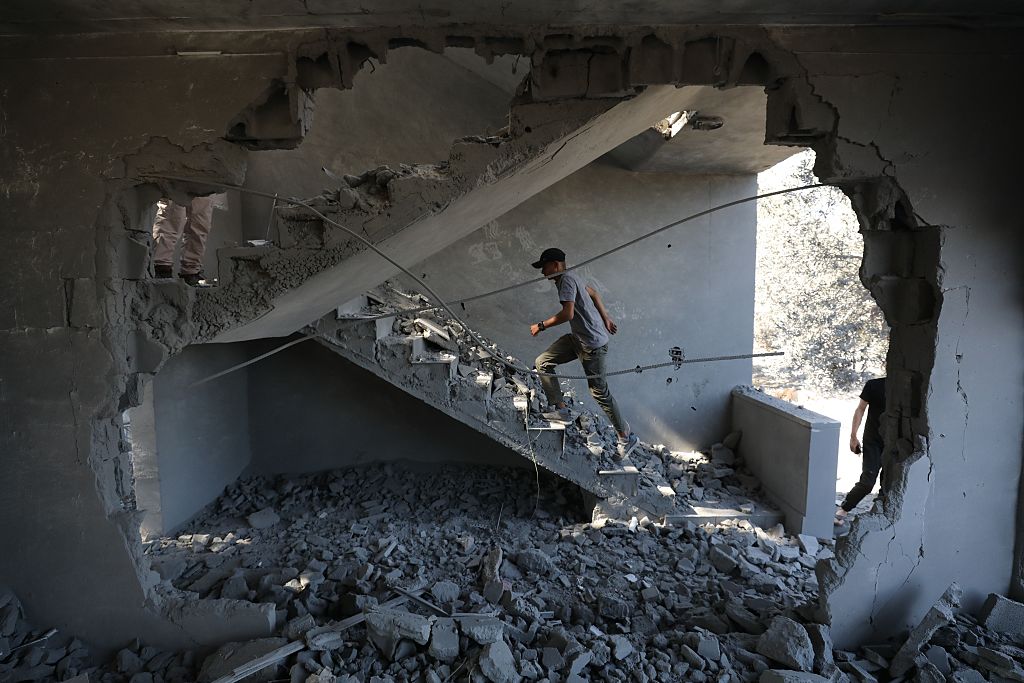With all eyes on Gaza and on the fallout from Israel’s war on five other fronts—Hezbollah in Lebanon, the Houthis in Yemen, Iranian militias in Syria and Iraq, as well as Iran itself—few have noted the unprecedented uptick in violence in the West Bank. Even the murder earlier in July of Saif Musallet, an American citizen, and the attack on CNN’s Jeremy Diamond as he was on his way to visit the family of the slain American—both by violent West Bank settlers—did little to attract attention to what is an increasingly unstable tinderbox, fanned by convergence of troubling factors
[time-brightcove not-tgx=”true”]
Although President Donald Trump’s early January decision to lift sanctions on settlers sent the wrong message, a series of significant developments on the ground have triggered the dramatic increase in West Bank violence: Israeli extremists seizing what they see as an opportunity; their leaders using government platforms to provide support; the IDF looking the other way; and many Palestinian youth becoming radicalized.
Looming over it all is the shadow of two of the most extreme leaders of the annexationist minority in Israel, entrusted, since late 2022, by Prime Minister Benjamin Netanyahu with portfolios directly relevant to West Bank policies.
One, Itamar Ben Gvir, a self-proclaimed Jewish Supremacist, controls the national police force. Since entering office, he has enacted a “hands of” policy concerning Jewish settler terrorists, relaxed the prerequisites for owning weapons and, prioritizing West Bank settlers, launched a campaign for Israelis to arm themselves.
The other, Bezalel Smotrich, employs his dual position as minister of finance and as a minister in the ministry of defense in the service of his three publicly declared objectives: rapid expansion of Jewish settlements, increase pressure on Palestinians to emigrate, and financially choking the Palestinian Authority to bring about its collapse.
A third, Minister of Defense Israel Katz, added fuel to the fire on Nov. 22, 2024, by depriving the Shin Bet (Israel’s Internal Security Agency) of a vital instrument in dealing with Jewish detainees: administrative detention. With settlers following legal advice not to cooperate with investigators and as evidence obtained by clandestine means cannot be used in an open court lest it exposes sources, court-supervised administrative detention has long proved essential in fighting terrorism—from extreme settlers or otherwise.
Emboldened by their leaders’ serving in such powerful positions, extremist settlers—by now organized and armed—have made the most of the situation as the Israeli public and the world at large focuses on Gaza.
The result: The number of incidents involving armed settlers assaulting Palestinian villages has increased dramatically over the past three years, doubling during the first half of 2025 as compared to the same period the previous year.
An additional factor relates to the IDF. Its manpower stretched to the limit, and the top brass consumed by tending to simultaneous challenges from several fronts, lower-rank commanders of units deployed to the West Bank are often reluctant to confront violent settlers, primarily because of the support they enjoy from senior government circles.
Last, but hardly least: With West Bank Palestinians harassed by settlers day and night, Palestinian youth, who are being put at risk, find neither the IDF nor the nearly bankrupt Palestinian Authority protecting their families. Images of the endless suffering of Gazans add to the combustible mix. With no hope for a better future, certainly not independence—which the current Israeli government vehemently opposes—their elders, scarred by the pains of the Second Intifada, have no persuasive argument to dissuade them from repeating what the elders have long concluded was a mistake: armed resistance. Consequently, young West Bank Palestinians are increasingly inclined to join militant groups or form their own, and take to arms.
Thus, Israeli extremists and radicalized Palestinians feed on each other, using each other to justify violence, killing innocents, vandalizing property, and risking a major conflagration in the process.
“Terrorism is terrorism, regardless of religion, race, or gender,” declared a recent urgent letter to Israel’s Minister of Defense. Sent on behalf of Commanders for Israel’s Security (CIS)—Israel’s largest group of retired generals and diplomats, of which I am a member, it alerted the Minister to the dire consequences of “organized Jewish groups…setting the area ablaze.”
“Resources must be mobilized,” we urged, “so that those guilty of terrorism are apprehended, investigated, and swiftly brought to justice.”
Although even the murder of an American citizen did little to change the dynamics, recent settlers’ assaults on IDF soldiers deployed to protect them, might have.
Even those who shamefully looked the other way when the victims were Palestinians—PM Netanyahu included—suddenly realized that this lawlessness could not be tolerated. “No civilized country can tolerate violent and anarchic acts of burning a military facility, damaging IDF property and attacking security personnel by citizens of the country,” said Netanyahu.
In contrast, opposition leader Yair Lapid described the events as “Jewish terrorists, gangs of criminals, who feel backed by the (governing) coalition.”
Time will tell whether this wakeup call triggers effective measures to end Jewish terrorism, which is as immoral as any other kind of terrorism. It also undermines Israel’s security and legitimacy. What is certain, from my vantage point, is this: if it does not spark those measures, this cycle of violence will only lead to the Gaza-ification of the West Bank, with tragic consequences for both peoples and further destabilizing effects well beyond the Israeli-Palestinian arena.

